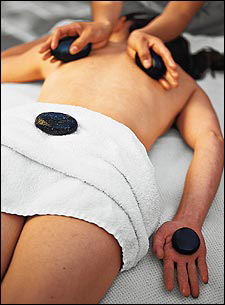 |
 |
 |
 Health & Beauty | December 2006 Health & Beauty | December 2006  
In Mexico, Luxury's Balanced By Spirituality
 Ann Levin - Associated Pres Ann Levin - Associated Pres


| | Rancho La Puerta's river-stone massage (John Durant/Rancho La Puerta) |
While Rancho la Puerta in Tecate, Mexico offers the same outrageously self-indulgent amenities as other luxury spas - including seaweed wraps and loofah salt rubs - it is just a little different: a bit less glitzy, perhaps a shade more spiritual.

It comes by these attributes honestly. Founded more than 65 years ago by an eccentric Hungarian, Edmond Szekely, the ranch was the subject of bemused articles in the late 1940s in the San Diego paper, dubbing "the professor" and his acolytes a "crypto-religious health cult."

Even back then, Szekely was advocating organic food, daily meditation and exercise, a mind-body connection. He railed against commercial fertilizers and pesticides, and he and his wife, Deborah, grew much of the food that their health-seeking guests ate.

Visitors paid just $17.50 to erect their own tent on the property, which in the early days had no running water or electricity, and nothing resembling a gym or a swimming pool.

Everyone chopped wood, worked the farm and in the kitchen, and tended the goat herd in the rolling hills nearby. The typical breakfast was raw goat's milk, bread from wheat grown and germinated by Deborah Szekely, and wild honey.

Most meals were vegetarian - a diet that has since been modified to include daily fish entrées and, occasionally, free-range poultry.

Out in the "real world," where Americans were just starting to fall in love with whipped cream in a can and cheese in a jar, all this emphasis on natural living was considered kind of nutty. But as the ranch grew and prospered, it gradually became more mainstream, even as the core of Szekely's "nutty" teachings gained widespread acceptance.

Today, the ranch sprawls over 3,000 acres at the foot of 3,885-foot Mount Kuchumaa, also known as Tecate Peak.

Guests stay in dozens of charming casitas scattered around the gently rolling property, many decorated with original Mexican folk art and equipped with fireplaces, patios and kitchenettes.

The public buildings and common areas are beautifully landscaped with brilliantly colored beds of flowers and trees and shrubbery specially chosen to thrive in Tecate's semiarid climate.

Winding paths meander past swimming pools, tennis courts, gymnasiums, a meditation labyrinth and the imposing Spanish Colonial dining hall.

Sculptures, including stunning pieces by Mexican sculptor Francisco Zuniga, adorn the lawns and other public spaces, and the scent of organically grown herbs permeates the massage and locker rooms.

Overseeing the operation is a well-trained staff of fitness instructors, massage therapists, cooks, gardeners and housekeepers, many of them Mexican. They tend to your every need, whether it's lighting a fire in your casita in the cool evenings or delivering a daily newspaper to your front door.

Yes, the real world does occasionally intrude into this paradise. When the Szekelys put down roots here in 1940, Tecate was a village of just 400 souls.

Today, the city is home to about 100,000 people and, with Tijuana just 16 miles to the west, part of a region whose population numbers at least 2 million.

Walk around the grounds and you can hear giant trucks whizzing by at all hours of the day. From the slopes of Mount Kuchumaa, considered a sacred site by the Kumeyaay Indians, you see - sadly - subdivisions and some of the ravages of uncontrolled growth and pollution.

But on the very same hike, you also can round a bend on that magical mountain and feel totally cut off from civilization. Before you lay vistas of puffy white clouds racing wildly over the mountain ranges, stark boulders lurching up toward the brilliant blue sky.

You discover the wild beauty and serenity that lured the Szekelys here so many years ago. Others, who don't opt for the morning hikes, find their bliss elsewhere: in a tai chi or dance class, on a massage table with hot river rocks on their back.

Wherever you find it, savor it. Because soon, very soon, you'll have to go home. | 
 | |
 |



